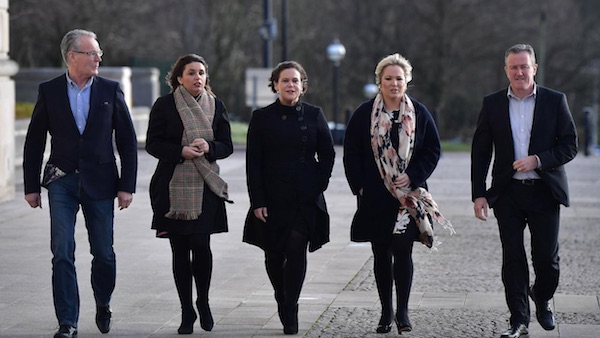
The new British Direct Ruler Karen Bradley has characterised the latest round of the talks process in Belfast as a final chance to salvage the devolved power-sharing institutions at Stormont.
Proposals to protect Irish language speakers, the ban on same-sex marriage and a lack of consensus on how to deal with the legacy of the conflict remain key areas of disagreement.
The hardline unionist DUP has also failed to respond to public concern over its Ministers’ actions in a financial scandal involving a compromised green energy scheme.
There were some reports of progress in initial discussions, although the failure of the British government to appoint an independent talks chair cast a shadow over the talks.
It is understood that round-table negotiations will not begin for another week. Michelle O’Neill she said she was anticipating a “short sharp phase of negotiation” and the anticipated timeframe for the negotiations was two weeks.
“We are determined to find a resolution that sees the institutions restored and delivering rights for all citizens,” she said.
“Credible, sustainable institutions can only be based on equality, respect and genuine partnership government.
“These talks will be a test of whether the British government and the DUP are finally willing to endorse these basic principles.”
A series of similar talks over the last 12 months have failed, with deadline after deadline set by the British government falling by the wayside.
The latest initiative will involve all five of the main Stormont parties, with the Ulster Unionists, the SDLP and Alliance all promised a role in the talks. The 26 County Irish foreign affairs minister Simon Coveney will also participate.
The British government has threatened to reintroduce full direct rule from London if the latest talks bid fails. Mrs Bradley is due to “update” the House of Commons on the state of play on February 7. She has insisted this is not a deadline, rather a “milestone”.
Meanwhile the Taoiseach has said people in the Six Counties should have the same rights as citizens of the 26 Counties and Britain. The Taoiseach was referring to rights-based disputes that are standing in the way of a return to devolved government in the north of Ireland.
“People in Ireland and in Britain can marry their same sex partner, I don’t see why Northern Ireland should be exceptional in that regard,” Mr Varadkar, who is openly gay, told the Dublin parliament.
“The same thing apples to issues such as language legislation and language rights.
“If these apply in Ireland, Scotland and Wales I think they should also apply in Northern Ireland.”
SDLP leader Colum Eastwood said his party would be “constructive” in seeking to secure a deal but he would urging the two governments to end the “cloak of secrecy”
The party has been calling for the British government to publish what has been agreed between the DUP and Sinn Fein during two previous rounds of negotiations last year.
“Before a new round of talks begins, the progress that was made during the last phase should now be published so that all parties understand what was agreed, who has stretched themselves to find a resolution and where each of the issues stand,” he said.
“Other parties cannot be asked to negotiate blind while the DUP and Sinn Fein refuse to put their cards on the table.” Sinn Fein negotiator Conor Murphy dismissed this, saying his party had “never conducted our negotiations in public”.
![[Irish Republican News]](https://republican-news.org/graphics/title_gifs/rn.gif)
![[Irish Republican News]](https://republican-news.org/graphics/title_gifs/harp.gif)

